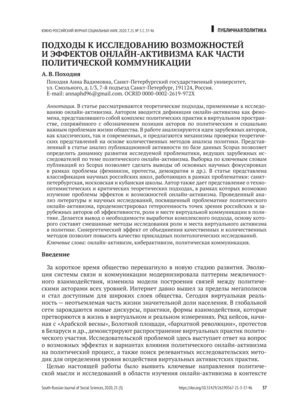Abstract
The article examines the theoretical approaches applicable to the study of online activism. The author introduces the definition of online activism as a phenomenon that represents a set of political practices in virtual space associated with the designation of actors' positions on political and socially important problems of society. The paper analyzes the ideas of foreign authors, both classical and modern, and proposes mechanisms for testing theoretical ideas based on quantitative methods of policy analysis. The analysis of publication activity on the Scopus database presented in the article allows determining the dynamics of development of the investigated problems, leading foreign researchers on the topic of political online activism. Keyword sampling of publications from Scopus allows us to conclude the main scientific focuses within the problem (feminism, protests, democracy, etc.). The article presents a classification of scientific Russian schools working within the framework of the problem: St.Petersburg, Moscow and Kuban schools. The author also gives an idea of techno optimistic and critical theoretical approaches, within the framework of which it is possible to study the problem of the effects and possibilities of online activism. The conducted analysis of the literature and scientific research devoted to the problems of political online activism demonstrated the heterogeneity of Russian and foreign authors' points of view on the effectiveness, role and place of virtual communication in politics. The conclusion is made about the need to develop a comprehensive approach, the basis of which will be mixed methods of research on the role and place of virtual activism in politics. The synergetic effect of combining qualitative and quantitative methods will improve the quality of applied political science research.
Keywords
References
Быков, И.А., Гладченко, И.А. (2019). К вопросу об исследованиях мобилизационного контента в социальных медиа. В Стратегические коммуникации в современном мире. Сборник материалов по результатам научно-практических конференций (с. 214–222). Саратов: Издательство "Саратовский источник".
Володенков, С.В. (2019). Влияние технологий интернет-коммуникаций на современные общественно-политические процессы: сценарии, вызовы и акторы. Мониторинг общественного мнения: Экономические и социальные перемены, 5, 341–364.
Гидденс, Э. (2005). Социология. Москва: Едиториал УРСС.
Кастельс, М. (2000). Информационная эпоха: экономика, общество и культура. Мoсква: ГУ ВШЭ.
Кастельс, М. (2016). Власть коммуникации. Москва: Издательский Дом Высшей школы экономики.
Курочкин, А.В., Никифоров, А.А. (2015) Гражданские инициативы в условиях сетевого общества: новые возможности и ограничения. Современные исследования социальных проблем, 1(45), 239–252.
Лебон, Г. (2018). Психология народов и масс. Москва: Издательство АСТ.
Липпман, У. (2014). Общественное мнение. Москва: Институт Фонда «Общественное мнение».
Ловинк, Г. (2019). Критическая теория интернета. Москва: Ад Маргинем Пресс.
Луман, Н.Л. (2004). Общество как социальная система. Москва: Издательство «Логос».
Луман, Н.Л. (2005). Реальность масс медиа. Москва: Праксис.
Мартьянов, Д.С. (2019). Управляемость виртуальных сообществ: сравнительный анализ политизированных групп Вконтакте. Журнал политических исследований, 3, 79–93.
Мирошниченко, И.В., Рябченко, Н.А. (2015). Сетевые ресурсы развития локальной политики. Среднерусский вестник общественных наук, 5, 38–49.
Морозов, Е.М. (2014). Интернет как иллюзия. Обратная сторона сети. Москва: Corpus.
Рейнгольд, Г. (2006). Умная толпа: Новая социальная революция. Москва: Фаир-пресс.
Рябченко, Н.А., Гнедаш, А.А. (2016). Цифровой активизм: новые медиа, гражданские приложения и технологические сообщества как основания для социально-политических изменений. В Сборник научных статей. Труды XIX Международной объединенной научной конференции «Интернет и современное общество (с. 48–55). Санкт-Петербург: Санкт-Петербургский национальный исследовательский университет информационных технологий, механики и оптики.
Сморгунов, Л.В. (ред.) (2013). Сетевой анализ публичной политики. Москва: РГ-Пресс.
Федорченко, С.В. (2019). Сетевой полис: гражданин на перекрестке реальной и виртуальной политики. Научно-аналитический журнал Обозреватель, 4, 68–85.
Филилипс, У (2016). Трололо: Нельзя просто так взять и выпустить книгу про троллинг. Москва: Альпина Паблишер.
Шерстобитов, А.С., Брянов, К.А. (2013). Технологии политической мобилизации в социальной сети «Вконтакте»: сетевой анализ протестного и провластного сегментов. Исторические, философские, политические и юридические науки, культурология и искусствоведение. Вопросы теории и практики, 10–1, 196–202.
Bastos, М., Mercea, D. (2016). Serial Activists: Political Twitter Beyond Influentials and the Twittertariat. New Media & Society, 10, 2359–2378.
Earl, J. (2011). Digitally Enabled Social Change: Activism in the Internet Age. Cambridge: Mit Press.
Earl, J. (2016). Protest Online: Theorizing the Consequences of Online Engagement. Cambridge University Press.
Habermas, J. (1992). Further Reflections on the Public Sphere. In Calhoun C.J. (Ed.) Habermas and the Public Sphere (pp. 421–461). Cambridge Mass.: MIT Рress.
Hill, S. (2013). Digital Revolutions. Activism in the Internet Age. Oxford: New Internationalist Publications Ltd.
Lasswell, H. (2007). The Structure and Function of Communication in Society. In H. Lasswell The Communication of Ideas (pp. 10–26). New York: The Institute of Religious and Social Studies.
Park, H.W. (2012). Measuring Twitter-based Political Participation and Deliberation in the South Korean Context by Using Social Network and Triple Helix Indicators. Scientometrics, 1, 121–140.
Park, H.W. (2019). Big Data Analysis and Modeling of Disinformation Consumption and Diffusion on YouTube. Retrieved from https://www.researchgate.net/publication/337080707_Big_Data_Analysis_and_Modeling_of_Disinformation_Consumption_and_Diffusion_on_YouTube
Shirky, С. (2011). The Political Power of Social Media Technology, the Public Sphere, and Political Change. Foreign Affairs, 1, 28–41.
Spulber, D.F., Yoo, C.S. (2009). Networks in Telecommunications: Economics and Law. Cambridge University Press.


